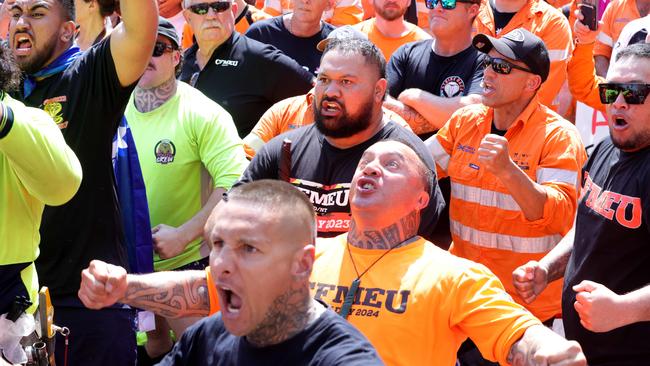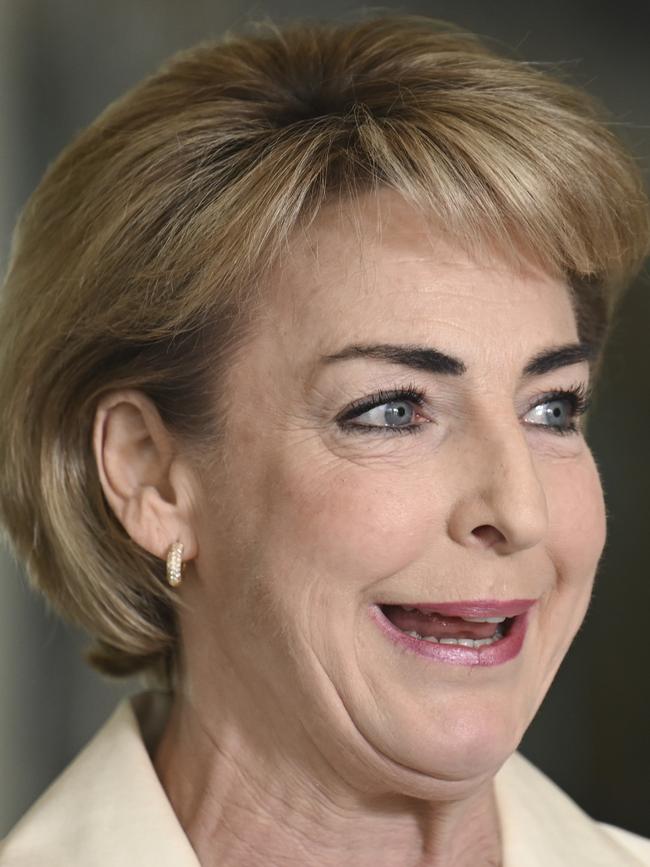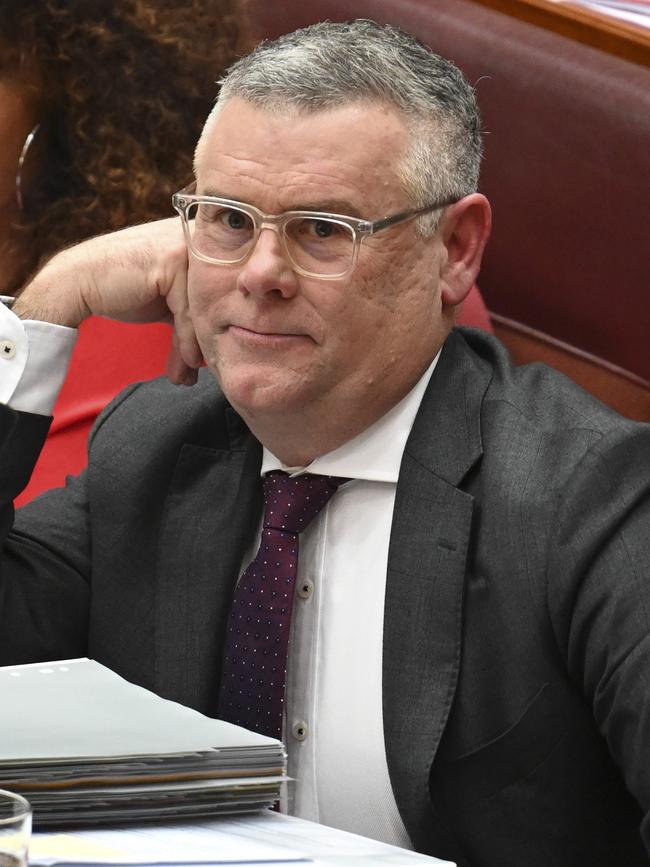‘Work Choices 2.0 vs unions running wild’
Political rhetoric on IR policy is heating up – but how credible are each side’s warnings?

Andrew Stewart has been analysing the politics and detail of industrial relations policy since the Accord era when Bob Hawke was prime minister. Ask the University of Adelaide law professor about the merits of Labor’s claim that Peter Dutton would bring back Work Choices, and he laughs out loud. “The answer is it’s a scare campaign,” he tells Inquirer.
As the opposition’s workplace policy stands, this is a pragmatic assessment. In reality, the Coalition has been largely gun-shy about backing the type of industrial relations changes craved by business since John Howard’s overreach contributed to the Liberals being turfed out of office at the 2007 election.
“There is not a lot of basis for a Work Choices 2.0 scare campaign at the moment, but could there be? This is what the Coalition is going to have to weigh up,” Stewart says.
“This has been the dilemma since 2007, which is that they’re being pushed by employer groups to make significant changes that would favour employers over workers, but they know if they do that they are just providing ammunition for the scare campaign.”
So keen are Labor and the ACTU to push the Work Choices narrative that even when the Liberals remain noncommittal about employer proposals – the shadow cabinet has yet to decide the IR policy – the government and unions urge voters to assume the Coalition will legislate any business request. Take, for instance, the call this week by the Australian Chamber of Commerce and Industry to expand the definition of small business from 15 to 25 employees.
ACCI chief executive Andrew McKellar framed the proposal as addressing the “unbearable” regulatory burden facing small business by exempting more businesses from the “productivity-killing measures” laws.
But once McKellar’s call was decoded and unpacked to assess the practical implications for workers, the debate quickly descended into a political brawl over unfair dismissal rights.
Under the existing law, workers need to be employed for at least six months before they can apply for unfair dismissal, but those working for a small business need to be employed for at least 12 months. By increasing the threshold to 25 employees, an additional one million workers would have to wait one year, double their existing waiting period.
Asked for the Coalition’s position, employment spokeswoman Michaelia Cash would say only that the opposition was “engaging with stakeholders and will announce our policies before the election”. She told The Australian, when speaking about the Coalition’s broader policy approach, that “we need to free up small businesses rather than stifling them with red tape and regulation”.
Workplace Relations Minister Murray Watt says Cash’s “free up” comments were a fresh sign that “Peter Dutton and the Coalition would cut pay and conditions if they won the election”.


“When Coalition ministers say small business needs to be ‘freed up’ from workplace laws, Australians know what they mean,” Watt says. “They mean a return to the lower wages and insecure work they delivered last time they held office.” Based on the Coalition’s actual commitments, that is a stretch, but what voters should expect from Labor and unions until election day.
“I do expect IR to be a key battleground at this election and that’s partly because of the size of the reform package that we have delivered and it’s partly because we know that the Coalition will seek to wind that back substantially,” Watt tells Inquirer.
“And I think really what it comes down to is there will be a choice for Australians about whether we want to see an economy that delivers higher wages, more secure jobs and safer workplaces or whether we want to wind all of that back and have Work Choices 2.0.
“I think another way of characterising it would be to say it’s a choice between Labor’s co-operative reforms that are delivering for workers and businesses or whether we want to resume the years of conflict, lower wages and lower productivity that we saw under the Coalition.”
Dutton and Cash have pledged to reverse Labor’s casual employment changes, scrap the right to disconnect and reinstate the Australian Building and Construction Commission and union regulator the Registered Organisations Commission. Business groups also would like a Coalition government to unwind or at least review Labor’s multi-employer bargaining provisions; same job, same pay labour hire laws; and enhanced workplace rights given to union delegates.
Cash refused requests to be interviewed for this article. She also declined to answer written questions about the Coalition’s position on multi-employer bargaining and same job, same pay laws; whether it would seek the deregistration of the CFMEU’s construction division; and its position on the annual minimum wage review given Labor has argued for an increase in line with inflation.
Instead, she provided a 456-word statement explaining the rationale for the Coalition’s existing commitments and general comments about small business.
Calling the right to disconnect law an example of Labor’s obsession with over-regulation, Cash said employers and employees were “incredibly confused about when the ‘right to disconnect’ applies, when it doesn’t apply, who it applies to, who is exempt and when contact outside of work hours is considered ‘reasonable’.
“By forcing businesses to strictly adhere to official work hours, employees lose the flexibility that many rely on to manage personal commitments, such as picking up the kids from school, attending an appointment or handling family matters,” she said.
Claiming Labor’s casual employment laws take flexibility and choice away from employers and employees, the Coalition will “provide clear guardrails for both employers and employees on when a staff member is a casual, the flexibility to negotiate the number of hours worked, the times of the day, the circumstances and the nature of its frequency that works for both of them”.
Business figures accept the political difficulty in the Coalition promising to scrap Labor’s laws, given the likely makeup of the Senate. What would be the point of burning political capital and giving credibility to Labor’s warnings on promises that could not get past a hostile crossbench?
Australian Industry Group chief executive Innes Willox says he would like the Coalition to commit to reviewing the multi-employer and same job, same pay laws if it wins the election.
“I don’t think anyone has any intention of wanting to cut wages. What we are after is the improvement in conditions where people can get, have and retain a job that is well-paid and is productive for the benefit of the country,” he says.
Nominating legislative priorities if Labor was re-elected, ACTU secretary Sally McManus says unions want non-compete clauses scrapped; gig worker minimum standards expanded to freelancers; and 10 days’ reproductive leave inserted into the National Employment Standards.
Unions want a watering-down of the employer capacity to lock out workers during industrial disputes and, in the long term, a review of the casual loading. They will also urge Labor to legislate to scrap junior pay rates for more than 500,000 workers aged 18 and older across the retail, fast-food and pharmacy sectors if unions fail to convince the Fair Work Commission to abolish them.
As for Labor’s agenda, Watt says the government has implemented a “very substantial reform agenda so certainly my priority now is bedding down the reforms that we have instituted”.
“I’m sure we’ll have more to say about industrial relations. I genuinely haven’t even begun to think about a second-term agenda at this point in time,” he says. “I’m sure we’ll have more to say about it leading up to the election but I think the overwhelming priority is to entrench and embed the large reform package that we’ve so far delivered.”
Watt and McManus face their own challenges over the decision to place the CFMEU’s construction division into administration, with furious building unions threatening to spend millions of dollars backing independent candidates at the election.
Communications, Electrical and Plumbing Union national secretary Michael Wright says there is a “deep rupture across the labour movement and the consequences are likely to be far-reaching”.
Stewart says the Coalition has not put a substantive workplace policy package to voters since the 2013 election, and Cash’s public statements reinforce his view that the Coalition is unlikely to show an appetite for significant policy change at this election.
“If they were trying to significantly increase the small business threshold, if they were proposing to undo same job, same pay, you could legitimately say about both those reforms that these were intended to cut some workers’ pay in the second case and take away the right of some election workers to apply for unfair dismissal in the first,” he says.
“If those reforms were part of the policy platform of the Coalition, you would say they would provide evidence to justify the accusation we are going back to Work Choices, even if only in a small way.” But he suspects the looming contest could be largely “performative” with the Coalition’s “rhetoric to be ‘unions running wild’ and Labor’s rhetoric to be Work Choices. All caps”.
“I think Work Choices, all these years on, still casts such a long shadow,” he says.






To join the conversation, please log in. Don't have an account? Register
Join the conversation, you are commenting as Logout